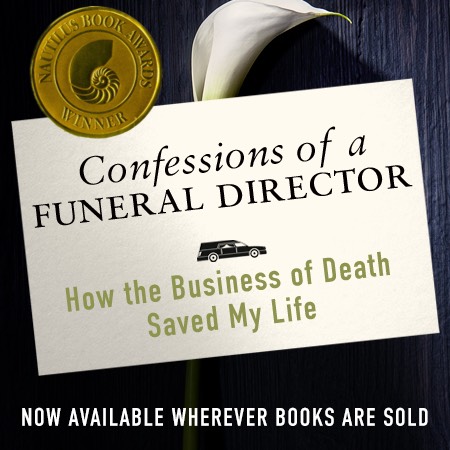Never Apologize for Your Grief
Note: I was editing this post when a house call came in. I don’t think I’ll be in front of a computer until late tonight, so I present to you a blog post with even MORE errors than normal 🙂
I just got off the phone with a lady who lost her husband back in August. She called because she wanted to order an urn plaque for her husband’s urn, and was inquiring about the details. Could she put a prayer on the urn plaque? Could she put his picture on the plaque? How long would it take to make it? Could we affix it to the urn for her?
“Yes, yes, a couple days, and yes”, I said.
After we were done, she asked, “Can you repeat all that because my mind still isn’t right?”
“Sure. No problem.”
“I’m so sorry” she pleaded. “My mind hasn’t been right since Jack died. I can’t think straight and I’m stuck in my own little world.”
“You’re right where you supposed to be,” I replied. “And your mind is working just fine.”
She thanked me and I told her I’d be in touch in a couple hours to go over the urn plaque draft before we send it to our plaque makers.
I’m not a grief counselor. I do have a certificate in Thanatology, but I’m not qualified to give specific, personalized advice to anyone. I can, though, speak to this shame associated with grief. A shame that comes from a bad idea.
That bad idea is this: that there’s something shameful about feeling weak.
*****
Let’s break it down so we can eradicate it.
WEAKNESS ISN’T …
Weakness isn’t tears. Tears of grief are symbols of love. There’s an outdated idea that says strength is the ability to go through trials and remain unaffected. That we’re all supp It’s a toxic view that’s seeped into our conception of masculinity, and our concept of how we think grief should look.
Weakness isn’t grief, no matter how that grief looks. Somewhere along the way, we’ve attached timelines and a particular set of expectations to grief. There’s this idea that it’s okay to grieve for a couple months, maybe a couple years, but if that grief still exists 10 years later, there’s something wrong with you. There’s another idea that if your grief looks different than our grief, you’re not right. Grief is the outflow of love, and love is the strength of humanity. I don’t tell my parents, my friends, or the people I work for how their love should look, nor do we tell them how long they should love. But we do it with grief and it simply doesn’t make sense.
Weakness isn’t shameful.
Most of our experience that we perceive as weakness, aren’t actually weakness … they’re just very much a part of our humanity. It’s human to cry, it’s human to grieve, it’s human to feel confused, to make mistakes, to try and fail, to change your minds, to change your jobs, your hobbies, to quit, to begin a new, to dream and doubt, make mistakes, to miss an opportunity and to grab one. This is the human experience, and none are weaknesses real or perceived.
But, if you actually have a weakness — something that legitimately hurts others and yourself — don’t approach it from a posture of shame. Approach it from a posture of vulnerability, that you know you’re weak, and that you need help.
WHOLENESS ISN’T …
Wholeness isn’t happiness. You are a whole human when you’re happy. You’re whole when you’re sad. You’re even whole when you’re broken. Because …
Wholeness isn’t the lack of brokenness. We’re not like inanimate objects, like plates, or cars, or clothing. If an inanimate object is broken, it doesn’t have the same usefulness that it did when it was whole. No, humans are the opposite. We become more useful, more powerful, more whole the more we lean into our brokenness.
Wholeness isn’t the only way you can be lovable. The idea that broken things can’t be loved is simply untrue, but the ever pervasive narrative that’s perpetuated through Hollywood and everywhere else is that only perfect things can be loved. Here’s the truth: perfect things are broken and we can be loved.
*****
This is the truth: Death, grief, tears, brokenness, weakness (perceived or real) doesn’t move us farther away from our humanity, it can move us closer. It’s not a question of “are you less of a person when your grieving?” The question is: can you approach your grief without shame, accept the process, and embrace the new normal?
I write in my book:
“I believe there’s a place hidden inside humans that hasn’t been wounded by shame and fear. A place where there’s still innocence, where we haven’t been calloused by the friction of hurt. A place so innocent that we can be ourselves, in all our messiness and peculiarity, and still believe that we’ll be loved. It’s a place where there’s no need to put up fronts of perfection and wholeness, no need to paint our faces and cover our flaws. That place is often exposed by death. We picture death’s hand as cold, capricious bone when it may be the hand of an expert clockmaker, able to turn and fix those intricate parts that still harbor a sense of Eden, where vulnerability is normal, and shame has little power. At Chad’s funeral, Eden had been rediscovered. No one was looking at their cell phones. No one was preoccupied with what they had done that morning or what they had to do afterward. IN onebeautiful moment, everyone was present and shame free.
*****
If you like my writing, consider buying my 2017 Nautilus Book Award Gold Winner, Confession of a Funeral Director (click the image to go to the Amazon page):

